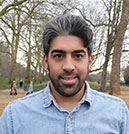Jul
03

Date: 3 July 2024
Time: 11:00 AM ET (New York Time)
Presenter(s): Mr. AmirEhsan Khorashadizadeh
Based on the IEEE Xplore® article:
"Conditional Injective Flows for Bayesian Imaging", published in the IEEE Transactions on Computational Imaging, February 2023.
Original article: Download article
Original article is open access and freely available to all for download.
Abstract
Most deep learning models for computational imaging generate a single reconstructed image from the given measurements. In practice, however, ill-posedness, nonlinearity, model mismatch, and noise often conspire to make such point estimates misleading or insufficient. The Bayesian approach models images and (noisy) measurements as jointly distributed random vectors and aims to approximate the distribution of possible solutions, the posterior distribution. By accessing the posterior distribution, we can generate multiple solutions leading to different scientific interpretations and enabling uncertainty quantification to pinpoint the regions reconstructed with low confidence. In this work, the presenter will propose an efficient Bayesian framework based on injective neural networks specifically designed for ill-posed inverse problems. They show that the proposed framework can efficiently learn the posterior distribution resulting in high-quality posterior samples and a physically meaningful uncertainty quantification. They develop this Bayesian framework for various imaging problems including limited-view CT and nonlinear inverse scattering.
Biography

AmirEhsan Khorashadizadeh received the B.Sc. degree in electrical engineering from the University of Tehran, Tehran, Iran, in 2018, and the M.Sc. degree from the Sharif University of Technology, Tehran, in 2020. He is currently pursuing the Ph.D. degree with the SADA Group, University of Basel, Basel, Switzerland.
His research lies at the intersection of machine learning and computational imaging. During his Ph.D., he focused on deep generative models and neural fields for various imaging modalities including computed tomography (CT), cryo-electron tomography (Cryo-ET) magnetic resonance imaging (MRI), and inverse scattering.
In 2023, Mr. Khorashadizadeh was awarded a grant from the University of Basel’s Promotion of Young Talent to spend nine months as a visiting researcher at University College London (UCL), London, U.K.
